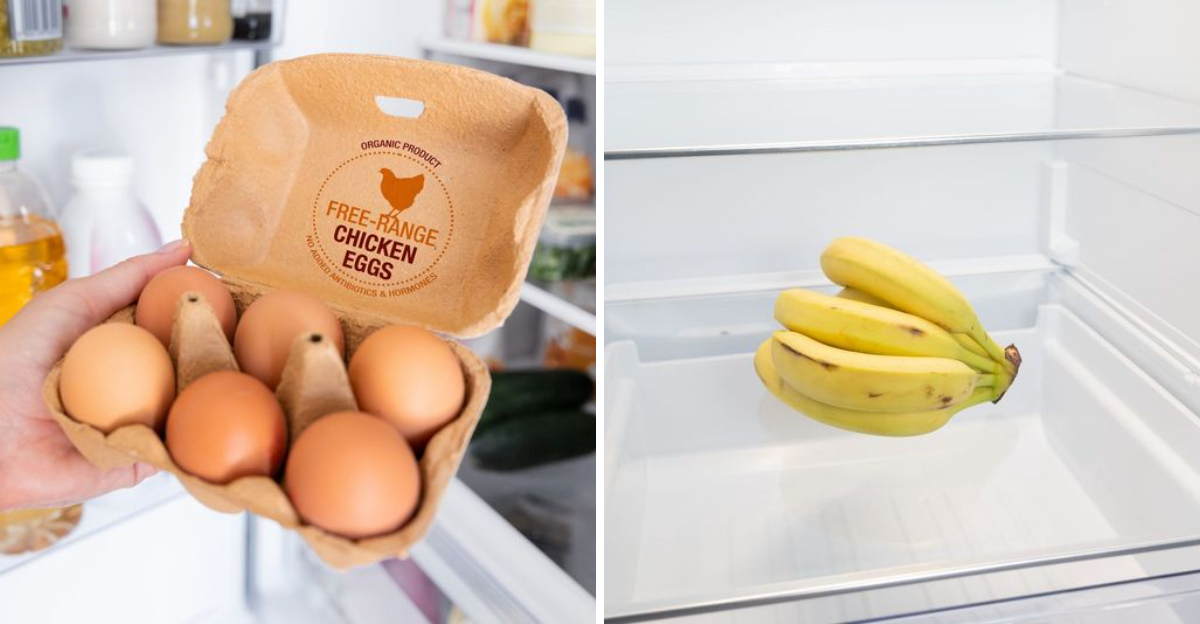6 Foods Best Left Out Of The Fridge, Plus 5 You’ve Got To Refrigerate

Mealy tomatoes, rock-solid honey, wilted greens – blame bad storage, not the food. Flavor, texture, and nutrients vanish fast when ingredients land in the wrong spot.
Some foods thrive in cool, dark corners of your fridge, while others fall apart in the cold. Time to find out which items belong where before your groceries betray you.
11. Tomatoes Turn Tasteless When Cold
Refrigeration zaps tomatoes of their flavor faster than you can say ‘BLT sandwich.’ The cold temperatures mess with their texture too, transforming juicy gems into mealy disappointments.
Keep these red beauties on the counter, stem-side down. They’ll continue ripening naturally, developing those complex sweet-tangy flavors that make tomatoes summer’s greatest gift.
10. Bananas Blacken Quickly In The Fridge
Cold temperatures shock these tropical fruits, turning their peels an unappetizing black while slowing down the ripening process inside. Talk about mixed messages!
Where should these curved yellow snacks live? A fruit bowl or banana hook away from direct sunlight. Though if they’re perfectly ripe and you’re not ready to eat them, a quick fridge trip can buy you an extra day.
9. Honey Never Spoils (Unless Refrigerated)
Did ancient Egyptians know something we don’t? Archaeologists have found 3,000-year-old honey in tombs – still perfectly edible! Its natural antibacterial properties make it virtually immortal.
Chilling honey triggers crystallization, turning your smooth liquid gold into a grainy, hard-to-use mess. Simply store it in your pantry with the lid tightly closed. No refrigeration needed for this eternal sweetener!
8. Potatoes Get Sweeter (In A Bad Way) When Cold
Surprise! Your fridge actually ruins potatoes. Cold temperatures convert their starch to sugar, creating an off-putting sweet taste that nobody wants in their mashed potatoes.
Plus, refrigeration speeds up sprouting. Store these starchy staples in a cool, dark place like a pantry or cupboard. A paper bag works wonders, but plastic bags trap moisture and accelerate spoilage.
7. Avocados Need Room Temperature To Ripen
Hard as rocks when you bought them? Avocados refuse to soften in the cold! Refrigeration halts the ripening enzymes that transform them into that creamy, spreadable goodness.
Keep them on the counter until they yield slightly to gentle pressure. Then and only then should these green gems move to the fridge, where they’ll last another 2-3 days before becoming guacamole candidates.
6. Coffee Beans Lose Flavor In The Fridge
Coffee beans are drama queens! They absorb surrounding odors like nobody’s business, which means your morning brew might taste faintly of last night’s leftover salmon if refrigerated.
Moisture from the fridge also degrades their oils, where all the delicious flavors hide. Store beans in an airtight container at room temperature, away from light, heat, and moisture. Coffee snobs know – freshness is everything!
5. Milk Turns Sour Without Refrigeration
Do you recall the days before refrigeration, when milk was delivered every day? That’s because of something! When milk is kept at room temperature, it becomes the ideal environment for bacteria to grow.
How soon does it go bad?
Bacteria can grow to the point that they might make you ill in just two hours at room temperature. Milk should be kept in the coldest section of your refrigerator rather than the door, where the temperature changes with each opening.
4. Eggs Last Longer When Chilled
Though Europeans often keep eggs on the counter, American eggs absolutely need refrigeration! Why the difference? U.S. eggs undergo a washing process that removes their natural protective coating.
Without this coating, eggs become porous and vulnerable to bacteria. Once refrigerated, they must stay that way – temperature fluctuations cause moisture to form, potentially drawing bacteria through the shell. Keep these protein powerhouses cold!
3. Opened Condiments Need Cold Protection
Mustard, ketchup, and mayo are taste bombs that must be refrigerated once opened! Why take the chance, even though some include enough vinegar or preservatives to last a short time at room temperature?
In particular, heated mayo becomes a bacterial playground.
These condiments are made to reside in your refrigerator door. Unlike your half-used bottle from last summer’s BBQ, restaurant ketchup bottles are often emptied and cleaned every night even if they are left out all day.
2. Berries Stay Fresh In The Fridge
Strawberries, blueberries, raspberries – these delicate fruits spoil faster than you can say “fruit salad” when left at room temperature. Their high moisture content makes them magnets for mold and mushiness.
Keep them chilled but don’t wash until ready to eat! Water accelerates spoilage. Pro tip: line your berry container with paper towels to absorb excess moisture, extending their juicy, delicious life by several precious days.
1. Meat And Fish: Never Leave Them Out
You are essentially inviting foodborne disease by keeping raw meat on your counter! Room temperature, or between 40°F and 140°F, is the risk zone for bacterial growth.
How stringent is this regulation? Absolutely! No raw meat should be left out for more than two hours (or one hour if the temperature is higher than 90°F). Use or freeze ground meats within one to two days, and keep these proteins in the coldest section of your refrigerator.
